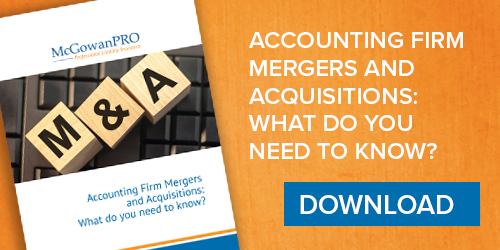Upward mergers are happening at record levels in the accounting industry. Mergers & Acquisitions (M&A) are an excellent way to reduce competition and make both parties more competitive in the already saturated accounting market. However, every accounting firm M&A is different, and you need to know how you can best prepare as either a buyer or seller.
Why have accounting firm M&As increased?
Smaller accounting firms are struggling to provide the wide breadth of expertise required to succeed in today’s landscape. Accounting firms are now expected to have expertise in cryptocurrency, wealth management, consulting services, and international trade. Smaller firms are also experiencing issues with succession. Merging with a more prominent firm allows them to benefit from a larger talent pool while securing leadership’s retirement.
On the flip side, larger firms are looking to merge with smaller, more niche businesses to expand their toolsets and help establish dominance in the industry. In this way, M&As benefit both parties.
How should sellers prepare?
There are a few things sellers should be aware of when positioning themselves for a successful merger. First, a buyer is unlikely to want to take over a lease. Most industries are trending towards remote work, and additional office space is no longer desirable.
However, technology is still a major selling point. Smaller firms should update their technological capabilities to allow buyers to integrate quickly and efficiently. Additionally, smaller firms should ask themselves a few questions. Has the potential buyer expressed interest in the client base? If so, keeping unprofitable clients as part of the negotiation may be possible. Have they asked for office space specifications? If so, they may be looking to acquire the office after all.
Ultimately, buyers are looking for:
- Strong and capable staff
- Clients that pay
- Operating metrics
- Commitment to quality service
Also read: A Great Employee Retention Plan Starts with Recruiting
What should buyers keep in mind?
On the buyer side, there needs to be a balancing act between the business’s goals and the stakeholders’ interests. To help satisfy everyone, keep the 4 Cs in mind:
- Customers: Customer satisfaction must be the #1 priority. Plan for customer retention, improving the customer experience, and how to best integrate services that will benefit the customer.
- Capabilities: Identify knowledge gaps; have a plan for retaining or re-recruiting necessary personnel; and create a process for transitioning roles or phasing employees out.
- Culture: Companies need to understand the strengths and weaknesses of their own working culture. They must also be able to successfully align the merging entities.
- Communication: Both companies should have communication processes in place that are as transparent as possible, explaining the benefits of the merger, why it is happening, and how it will affect the future of the company.
The 4 Cs allow companies to have a checklist for putting their personnel and stakeholders at ease during an accounting firm M&A.
Also read: What is the Pass-through Entity Tax (PTET)?
Ensuring accounting firm M&A deals succeed
Merging two companies that have different ways of working and potentially clashing cultures can lead to friction and even the breakdown of negotiations. Here are two common pitfalls to avoid along the way to a successful accounting firm M&A.
- Merging for the wrong reasons. Bigger is not always better, especially if the merging companies aren’t equipped to capitalize on the benefits of scale. Strong reasons to merge are increasing a talent pool, entering a new market, adding niche services, or alleviating succession issues.
- The deal is lopsided. If merging only benefits one party, then it’s easy for the other to feel slighted and pull out of the deal. This can also occur if changes are implemented too quickly, such as an overhaul in work culture. It can result in disgruntled employees and clients being forced to adapt to the sudden changes.
Typically, deals fall apart because they didn’t meet the merging firm’s original financial, strategic, and professional objectives. Therefore, communication is key to a successful accounting firm M&A for all parties involved. With an effective strategy in place that is transparent and readily available to all, both merging entities are setting themselves up for success.
Download our E-book to learn more about account firm M&As: Accounting Firm Mergers and Acquisitions: What do you need to know?
Prioritize protecting your firm
Despite being beneficial in the long run, the structural and operational changes associated with M&As can be daunting. Having comprehensive professional liability insurance coverage in place gives you the security you need to proceed with confidence.
McGowanPRO provides highly specialized insurance programs in a broad spectrum of industries. Our Accountants E&O Insurance combines the best qualities of policies on the market and fills critical gaps in common coverage options.
Contact us today to learn more about our professional liability insurance options.


